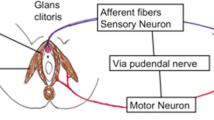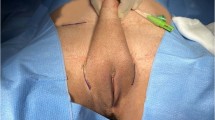Abstract
Historically, medical management of Congenital Adrenal Hyperplasia (CAH) in girls typically involved feminising surgery, which meant reducing the size and/or visibility of the enlarged clitoris. This practice may have become less routine but remains a common response to genital differences associated with CAH. Parents typically give permission for the child to undergo surgery in early childhood and recommend other parents facing a similar situation do the same. The current report is based on a qualitative content analysis of interviews with sixteen parents whose daughters with CAH had undergone one of two forms of clitoral surgery. We observed that: (i) some parents were initially unconcerned about their child’s genital presentation; (ii) in general, clitoral surgery was considered as a readily available and natural response to the child’s bodily difference; (iii) the parents acknowledged that there would be some risk but anticipated various benefits; and (iv) there was an absence of ethical considerations when the parents evaluated the various effects of surgery afterwards. We conclude from our analysis that parents of girls with CAH may not receive psychologically and ethically informed counselling to encourage critical reflections prior to authorizing genital surgery.
This is a preview of subscription content, access via your institution
Access options
Subscribe to this journal
Receive 8 print issues and online access
$259.00 per year
only $32.38 per issue
Buy this article
- Purchase on Springer Link
- Instant access to full article PDF
Prices may be subject to local taxes which are calculated during checkout
Similar content being viewed by others
References
Undre S, Cherian A. Paediatric Urology. Surgery (United Kingdom). 2020;38:239.
Sinha CK, Davenport M. Handbook of pediatric surgery. Handbook of Pediatric Surgery. 2010. https://doi.org/10.1007/978-1-84882-132-3_1
Wilcox DT, Thomas DFM. Essentials of Pediatric Urology. 2021;267–82. https://doi.org/10.1201/9781003182023.
Ludwikowski BM, González R. The surgical correction of urogenital sinus in patients with DSD: 15 years after description of total urogenital mobilization in children. Front in Pediatr. 2013;1:369–78.
WAGtv. Secret Intersex. 2004.
Lee PA, Houk CP, Ahmed SF, Hughes IA. Consensus statement on management of intersex disorders. International Consensus Conference on Intersex Paediatrics. 2006;118:e448–500.
Michala L, Liao LM, Wood D, Conway GS, Creighton SM. Practice changes in childhood surgery for ambiguous genitalia? J of Pediatr Urol. 2014;10:934–9.
Mendez J Report of the Special Rapporteur on Torture and other cruel, inhuman or degrading treatment or punishment. Human Rights Council 22nd session. 2015.
Lundberg T, Dønåsen I, Hegarty P, Roen K. Moving intersex/dsd rights and care forward: Lay Understandings of Common Dilemmas. J of Soc and Political Psychology. 2019;7:354–77.
Davis, GContesting Intersex: The Dubious Diagnosos. 2015.
Meyer-Bahlburg HFL, Khuri J, Reyes-Portillo J, New MI. Stigma in medical settings as reported retrospectively by women with congenital adrenal hyperplasia (CAH) for their childhood and adolescence. J Pediatr Psychol. 2017;42:496–503.
Streuli JC, Vayena E, Cavicchia-Balmer Y, Huber J. Shaping parents: impact of contrasting professional counseling on parents’ decision making for children with disorders of sex development. J of Sex Med. 2013;10:1953–60.
Crissman HP, Warner L, Gardner M, Carr M, Schast A, Quittner AL, et al. Children with disorders of sex development: a qualitative study of early parental experience. Int J of Pediatr Endocrinol. 2011;2011:10. https://doi.org/10.1186/1687-9856.
Dayner JE, Lee PA, Houk CP. Medical treatment of intersex: parental perspectives. J of Urol. 2004;172:1762–5.
Sanders C, Carter B, Goodacre L. Parents need to protect: influences, risks and tensions for parents of prepubertal children born with ambiguous genitalia. J of Clin Nurs. 2012;21:3315–23.
Timmermans S, Yang A, Gardner M, Keegan CE, Yashar B, Fetchner PY, et al. Does patient-centered care change genital surgery decisions? the strategic use of clinical uncertainty in disorders of sex development clinics. J of Health and Soc Behav. 2018;59:520–35.
Shalaby M, Chandran H, Elford S, Kirk J, McCarthy L. Recommendations of patients and families of girls with 46XX congenital adrenal hyperplasia in the United Kingdom regarding the timing of surgery. Pediatr Surg Int. 2021;37:137–43.
Bennecke E, Bernstein S, Lee P, van de Grift TC, Nordenskjold A, Rapp M, et al. Early genital surgery in disorders/differences of sex development: patients’ perspectives. Arch of Sex Behav. 2021;50:913–23.
Sanders C, Carter B, Goodacre L. Searching for harmony: Parents’ narratives about their child’s genital ambiguity and reconstructive genital surgeries in childhood. J of Adv Nurs. 2011;67:2220–30.
Baratz AB, Feder EK. Misrepresentation of evidence favoring early normalizing surgery for atypical sex anatomies. Arch of Sex Behav. 2015;44:1761–3.
Roen K. Intersex or diverse sex development: critical review of psychosocial health care research and indications for practice. J of Sex Res. 201;56:511–28.
Liao LM, Roen K. The role of psychologists in multi-disciplinary teams for intersex/diverse sex development: interviews with British and Swedish clinical specialists. Psychol and Sexuality. 2019:202-16 https://doi.org/10.1080/19419899.2019.1689158.
Liao LM, Hegarty P, Creighton S, Lundberg T, Roen K. Clitoral surgery on minors: an interview study with clinical experts of differences of sex development. BMJ Open. 2019;9. https://doi.org/10.1136/bmjopen-2018-025821.
Ernst MM, Liao L-M, Baratz AB, Sandberg DE. Disorders of sex development/intersex: gaps in psychosocial care for children. gaps in disorders and/or differences of sex development psychosocial care paediatrics. Pediatrics. 2018;142:2017–4045.
Baratz AB, Feder EK. Misrepresentation of evidence favoring early normalizing surgery for atypical sex anatomies. Arch of Sex Behav. 2015;44:1761–3.
Chambers C. Choice and female genital cosmetic surgery. Female Genital Cosmetic Surg. 2019. https://doi.org/10.1017/9781108394673.008
Baron RS, Vandello JA, Brunsman B. The forgotten variable in conformity research: impact of task importance on social influence. J of Personality and Soc Psychol. 1996;71.
Hovland CI, Weiss W. The influence of source credibility on communication effectiveness. Pub Opin Quarterly. 1951;15:635–50.
Spencer C. Independence or conformity in the Asch experiment as a reflection of cultural and situational factors. British J of Soc Psychol. 1981;20:205–9.
DaJusta D, Xu L, Baker L. 535 frequency of feminising genitoplasty for congenital adrenal hyperplasia with geographical distribution of surgeries in the US. J of Urol. 2010;183.
Garland F, Thomson M, Travis M, Warburton J. Management of ‘disorders of sex development’/intersex variations in children: results from a freedom of information exercise. Medical Law Int. 2021;21:116–46.
Monro S, Carpenter M, Crocetti D, Davis G, Garland F, Griffiths D, et al. Intersex: cultural and social perspectives. Culture, Health and Sexuality. 2021;23:431–40.
Clarecais. Differently normal happily living with complete androgen insensitivity. 2020.
Acknowledgements
We are grateful to the families who participated in this study and to reviewers and editors who urged us to clarify our novel findings and the strengths of this study.
Funding
Funded by ESPE Research Unit (European Society for Paediatric Endocrinology) without input to design, data collection, analysis, interpretation, writing of the manuscript, or in the decision to submit the manuscript.
Author information
Authors and Affiliations
Contributions
JA was responsible for study design, recruitment, conducting the research, report writing and revisions. MS was responsible for recruitment, report and revisions review including illustrative coded quotations data. ECC was responsible for study design, recruitment, revisions reviews including illustrative coded quotations, and data editing, impacting the narrative and conclusions.
Corresponding author
Ethics declarations
Competing interests
The authors declare no competing interests.
Ethical approval and consent to participate
The study was approved by the Southwest NHS ethics process (Rec Ref 15/SW/0253). UHB RNI Informed consent was participants completed informed consent was obtained from all participants.
Additional information
Publisher’s note Springer Nature remains neutral with regard to jurisdictional claims in published maps and institutional affiliations.
Rights and permissions
About this article
Cite this article
Alderson, J., Skae, M. & Crowne, E.C. Why do parents recommend clitoral surgery? Parental perception of the necessity, benefit, and cost of early childhood clitoral surgery for congenital adrenal hyperplasia (CAH). Int J Impot Res 35, 56–60 (2023). https://doi.org/10.1038/s41443-022-00578-0
Received:
Revised:
Accepted:
Published:
Issue Date:
DOI: https://doi.org/10.1038/s41443-022-00578-0
This article is cited by
-
Child genital cutting and surgery across cultures, sex, and gender. Part 1: female, male, intersex—and trans? The difficulty of drawing distinctions
International Journal of Impotence Research (2023)
-
Child genital cutting and surgery across cultures, sex, and gender. Part 2: assessing consent and medical necessity in “endosex” modifications
International Journal of Impotence Research (2023)



